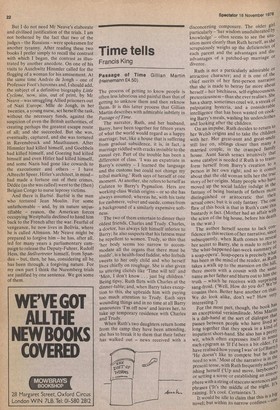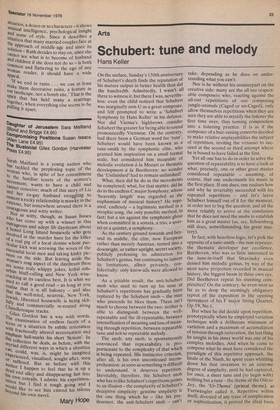Time tells
Francis King
passage of Time Gillian Martin (Heinemann £4.50) The process of getting to know people is often less laborious and painful than that of getting to unknow them and then reknow them. It is this latter process that Gillian Martin describes with admirable 'subtlety in Passage of Time.
The narrator, Ruth, and her husband, Barry, have been together for fifteen years of what the world would regard as a happy marriage; but, like a house that is suffering from gradual subsidence, it is, in fact, a marriage riddled with cracks invisible to the casual eye. Part of the trouble has been a difference of class. 'I was an expatriate in Barry's country — I learned the language and the customs but could not change my tribal marking,' Ruth says of herself at one moment. At another, she refers to herself as Galatea to Barry's Pygmalion. Hers are working-class Welsh origins — or so she has always assumed; whereas he, with his taste for cashmere, velvet and suede, comes from a background of a similarly expensive softness.
The two of them entertain to dinner their oldest friends, Charles and Trudy. Charles, a doctor, has always felt himself inferior to Barry; he also suspects that his fatness must be repellent to women. Trudy, so thin that 'her body seems too narrow to accommodate all the organs that there must be inside', is a health-food faddist, who forbids sweets to her only child and who herself lives chiefly on roughage. She is also given to uttering clichés like 'Time will tell' and 'Men, I don't know . . . just big children.' Being filmy, Ruth flirts with Charles at the dinner-table; and, when Barry takes exception to this, she upbraids him with paying too much attention to Trudy. Each says wounding things and in no time at all Barry announces 'I'm off now' and leaves her, to take up temporary residence with Charles and When Treun Ruth's th's two daughters return home from the camp they have been attending, she has to break it to them that their father has walked out — news received with a Spoctator 18 November 1978 disconcerting composure. The older girl particularly — 'her wisdom unadulterated by knowledge' — often seems to see the situation more clearly than Ruth herself, as she scrupulously weighs up the deficiencies of each parent and the advantages and disadvantages of a patched-up marriage or divorce.
Ruth is not a particularly admirable or attractive character; and it is one of the chief merits of her first-person narrative that she is made to betray far more about herself — her bitchiness, self-righteousness, pretentiousness — than she ever realises. She has a sharp, sometimes cruel wit, a streak of palpitating hysteria, and a considerable intelligence that has been wasted on cooking Barry's meals, washing his underclothes and looking after the children. On an impulse, Ruth decides to return to her Welsh origins and to take the children with her. Her great-aunt and great-unele still live on, siblings closer than many a married couple, in the cramped fainilY house. Aunt Sarah senses intuitively that some catalyst is needed if Ruth is to transform herself from Barry's creation to a person in her own right; and so it comes about that the old woman tells her the true story of her origins. Many people who have moved up the social ladder indulge in the fantasy of being bastards of fathers inore distinguished or aristocratic that their actual ones; but it is only fantasy. The one flaw of this book is that in Ruth's case this bastardy is fact. (Mother had an affair with the scion of the big house, before his death in the herself seems to lack eont war.) author fidence in this section of her narrative, since, subsequently, when Ruth comes to reveal her secret to Barry, she is made to refer tni, 'the what-happened-last-week summary 0.1 a soap-opera'. Soap-opera is precisely wilt! has been in the mind of the reader, as Rut': takes a walk up to the mansion on the bilh there meets with a cousin with the sante name as her father and blurts out to him tile truth — which he receives with surprisil sang-froid. ('Well. How do you do? Wer cousins then. Better have another on that. We do look alike, don't we? How verY most part, though, the book ha,5 interesting.') gl an exceptional verisimilitude. Miss Martin, is a dab-hand at the sort of dialogue ths' passes between people who have lived s'ti long together that they speak in a kind 0., impatient short-hand. She also has a PrettJe wit, which often expresses itself in sot0 such epigram as 'If I'd been a bit older, have realised how young! was' or (of Barri; 'He doesn't like to compete but he d°,.ee need to win.' Most of the narrative is in present tense, with Ruth frequently adm°111ishing herself ('Up and move, lazyboiless" or setting a scene or establishing an atm% phere with a string of staccato sentences phrases (It's the middle of the night. ' raining. It's cool. Certainties:). It would be idle to claim that this is a bige novel; but within its narrow confines — situation, unusu a dozen or so characters —it shows al intelligence, psychological insight and sense of style. Since it describes a situation that many married couples face at the approach of middle-age and since its solution— Ruth decides to stay on, since she cannot see what is to become of husband and children if she does not do so — is both common and flattering to the ego of any woman reader, it should have a wide aPPeal.
If we end in ruins we can at least inake them decorative ruins, a feature in Our landscape, not a bomb site.' That is the sPirit that has held many a marriage together, when everything else seems to be Pulling it apart.



































 Previous page
Previous page